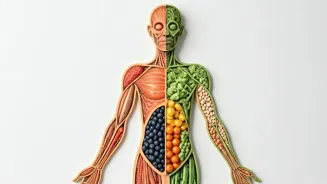Carbs Make You Fat
For years, the idea that carbohydrates directly lead to weight gain has been circulating. This section challenges this notion. The core concept is that the type
and quantity of carbohydrates matter, not just the carbs themselves. Refined carbs, those stripped of fiber and nutrients, can lead to weight gain due to their quick impact on blood sugar levels. This, in turn, can cause overeating. Complex carbohydrates, such as whole grains, vegetables, and fruits, are full of fiber and other essential nutrients. They provide sustained energy and promote satiety. The body's reaction to carbs hinges on their quality and how they are consumed. It's more about choosing nutrient-rich carbs and practicing mindful eating habits than shunning them altogether. Focusing on moderation and choosing the correct carbs plays a crucial role in weight management.
All Fat Is Bad
The pervasive belief that all fats contribute negatively to health is debunked. This section emphasizes the importance of understanding that there are different kinds of fats, some beneficial, some less so. Unsaturated fats, found in foods like avocados, nuts, and olive oil, are vital for heart health and overall wellbeing. They help lower bad cholesterol levels and provide essential fatty acids. Conversely, saturated and trans fats, often found in processed foods and certain animal products, should be consumed in moderation. Trans fats, in particular, have been linked to increased health risks and should be avoided whenever possible. The article also highlights the importance of balancing fat intake and choosing healthy sources to maintain optimal health and prevent chronic diseases.
Breakfast Is Mandatory
The idea that breakfast is the most important meal of the day is analyzed. While breakfast can offer several benefits, this section reveals that skipping it does not necessarily lead to negative health outcomes for everyone. The emphasis should be placed on the individual's preferences and body's needs. Some individuals thrive with breakfast, experiencing improved energy levels and focus throughout the morning. Others may not feel hunger early or find that skipping breakfast does not negatively impact their overall wellbeing. The key is to listen to your body's signals and adjust your eating schedule. If breakfast is a part of your routine, ensure it includes a mix of protein, complex carbohydrates, and healthy fats for sustained energy. If skipping breakfast suits your lifestyle, make sure to have a balanced meal later in the day.
Detox Diets Work
This section addresses the claims surrounding detox diets. Detox diets, often marketed as a quick fix to cleanse the body of toxins, are not supported by scientific evidence. The body has its own efficient detoxification system: the liver and kidneys. These organs are designed to filter waste and toxins. Detox diets, which typically involve restrictive eating or consuming specific juices, often lack essential nutrients. They can lead to nutrient deficiencies and may negatively impact metabolism. The article advises that the most effective way to support the body's natural detoxification processes is through a healthy diet rich in whole foods, adequate hydration, regular exercise, and sufficient sleep. Prioritizing these habits is more beneficial than following any restrictive detox programs.
Calories In, Calories Out
The assumption that weight loss is solely determined by the balance between calorie intake and expenditure is a common misconception. The discussion delves deeper into the complexity of weight management. Factors like metabolism, hormones, genetics, and the quality of food consumed play significant roles in weight loss and maintenance. Foods high in nutrients and fiber promote satiety, which can reduce overall calorie consumption. Exercise does not just burn calories but also impacts metabolism and muscle mass. This affects how efficiently the body burns energy. The focus should be on eating whole, unprocessed foods and incorporating regular physical activity. While calorie awareness is helpful, considering the holistic picture of one's lifestyle and dietary choices is key for long-term health.
Supplements Replace Food
The belief that supplements can completely replace a balanced diet is debunked. While supplements have a role in filling specific nutritional gaps, they cannot fully replicate the benefits of whole foods. Whole foods provide a variety of nutrients, including vitamins, minerals, fiber, and phytonutrients, which work synergistically to support overall health. These nutrients often work in ways that are not fully understood. Reliance on supplements without a foundation of healthy eating may lead to nutrient imbalances or other complications. The article emphasizes the importance of a nutrient-rich diet as the primary source of essential nutrients, with supplements only as an adjunct when needed. Consult a healthcare provider to discuss the right way to use supplements.
Fruit Should Be Avoided
This section challenges the fear many have of fruit due to its natural sugar content. The article suggests that fruit should be included in a balanced diet due to its many health benefits. Fruits offer vitamins, minerals, antioxidants, and fiber, which are essential for overall health. The sugar in fruit, fructose, is naturally packaged with these nutrients, and fiber helps moderate the absorption of sugar into the bloodstream. It is crucial to consider the whole food package. Choosing whole fruits over fruit juices is better due to the fiber content. Moderate fruit consumption, in line with dietary guidelines, does not typically lead to adverse health outcomes. Understanding the benefits of fruit helps in including it as part of a balanced diet.
Artificial Sweeteners Are Safe
The long-held assumption that artificial sweeteners are a healthy alternative to sugar is evaluated. The article brings attention to the ongoing debates about the long-term effects of artificial sweeteners. While these sweeteners may help reduce calorie intake, some studies suggest potential impacts on the gut microbiome, metabolism, and appetite regulation. The research continues to evolve, and it's important to approach the topic with caution. Moderation and awareness are encouraged, and consulting with a healthcare professional for personalized advice is crucial. Being aware of the potential effects, the importance of reading labels, and making informed choices can support health and wellbeing.
Eating Late Is Bad
This section evaluates the idea that eating late at night leads to weight gain. The timing of meals is less critical than the overall calorie intake and choices. It is generally believed that when you eat is less important than what you eat. Eating late at night can lead to weight gain if it results in an increased overall calorie intake or if the late-night snacks are unhealthy. However, if late-night eating is part of a daily calorie balance and involves healthy food choices, it might not be that harmful. It's more crucial to be mindful of portion sizes, food choices, and overall eating habits. Establishing healthy eating patterns, avoiding unnecessary snacking, and listening to your body's hunger cues can help regulate weight, irrespective of the time of day.
Low-Fat Is Always Better
The pervasive belief that low-fat products are always the best choice is challenged. Many low-fat products compensate for the lack of fat by adding sugars, salt, and additives to maintain taste and texture. These additives can sometimes result in the consumption of more calories and less nutritional value than their full-fat counterparts. The focus should be on the overall quality of food and not solely on its fat content. Healthy fats, such as those found in avocados, nuts, and olive oil, are crucial for brain function, hormone production, and the absorption of fat-soluble vitamins. It is best to read labels carefully, consider the ingredients, and choose whole, unprocessed foods over those overly processed to be low in fat. Moderation and a balanced approach are the keys to dietary success.


















